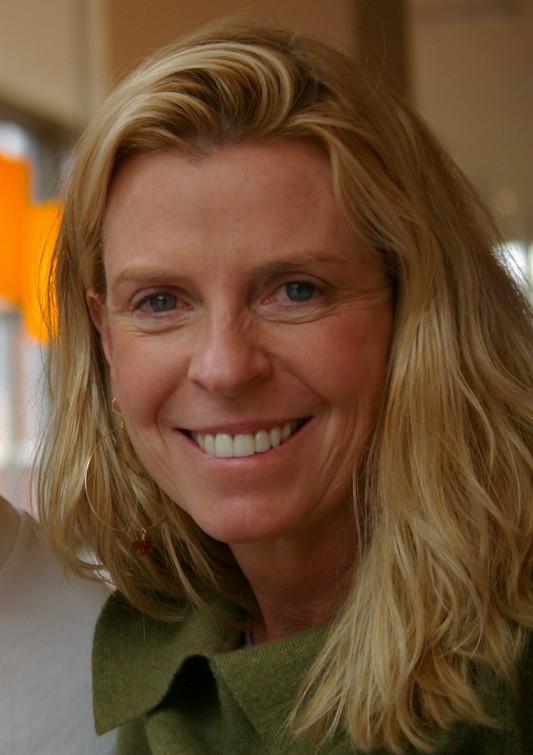Terry Sears of Tuesday’s Children: “Being your best cheerleader is key”
Throughout the day, pour on the positivity and congratulations. Being your best cheerleader is key. In this interview series, we are exploring the subject of resilience among successful business leaders. Resilience is one characteristic that many successful leaders share in common, and in many cases, it is the most important trait necessary to survive and thrive […]
The Thrive Global Community welcomes voices from many spheres on our open platform. We publish pieces as written by outside contributors with a wide range of opinions, which don’t necessarily reflect our own. Community stories are not commissioned by our editorial team and must meet our guidelines prior to being published.

Throughout the day, pour on the positivity and congratulations. Being your best cheerleader is key.
In this interview series, we are exploring the subject of resilience among successful business leaders. Resilience is one characteristic that many successful leaders share in common, and in many cases, it is the most important trait necessary to survive and thrive in today’s complex market.
I had the pleasure of interviewing Terry Sears.
Terry Grace Sears is the Executive Director of Tuesday’s Children, a nonprofit family service organization, based in New York. Following the events of Tuesday, September 11, 2001, Tuesday’s Children was founded with a long-term commitment to serve and support the 3,051 children who lost a parent on that day. In subsequent years, the organization broadened its mission to include all those impacted by 9/11, and in particular, the responder community. After the 15th Anniversary of 9/11, Tuesday’s Children began to address the ripple effect of September 11th and provide long-term support to military families of the fallen, as well as sharing lessons learned with other communities impacted by terrorism and war worldwide.
Long devoted to the challenges faced by children, families and communities, Terry served as the Chairman of the Board of Tuesday’s Children since its founding, and then in 2004, assumed the role of Executive Director. Terry successfully led the organization through the milestones of the 10th and 15th anniversaries of the September 11th. Terry has been pivotal in Tuesday’s Children’s evolution from a 9/11-focused organization to a nationally focused nonprofit serving military families of the fallen and other communities impacted by traumatic events and mass-scale tragedies. A graduate of Fordham University, Terry serves on the Board of Citizens Against Government Waste, the Sarita Kenedy East Foundation and the Santa Maria Foundation. Terry and her husband Richard, along with their four children, are lifelong residents of Manhasset, NY, a community that was heavily impacted by losses on September 11th.
Thank you so much for joining us! Our readers would love to get to know you a bit better. Can you tell us a bit about your backstory?
I was born and raised and still live in Manhasset, LI, a community hard hit by the losses on Tuesday, September 11th, 2001. There were many families that lost sons and daughters, neighbors, and friends. It was one of those commuter towns where so many people traveled into the financial district every day by train. For days after 9/11 there were cars still parked at the Manhasset train station, whose owners would never return to claim them.
This magnitude of loss drove me to become involved with Tuesday’s Children. The organization was founded by a group of relatives of these victims, who wanted to ensure that the 3,051 children who lost a parent would be able to live happy and fulfilling lives that were not defined nor limited by this tragedy. I had nonprofit experience and I wanted to help and was asked to become the first Board Chair, and a few years later I became the Executive Director.
Can you share with us the most interesting story from your career? Can you tell us what lessons or ‘takeaways’ you learned from that?
In 2008, Tuesday’s Children’s top funders were Bear Stearns and other Wall Street entities such as Lehman Bros. Suddenly, those corporate funders were no longer there, and many of our individual supporters were out of work and unable to provide support. Our organizational budget needed to be cut in half, loyal staffers needed to be let go, regional offices needed to be closed and, like many non-profits at that time, our survival was in jeopardy.
We did everything we could to keep the promise we made to our families and keep our doors open and our services going. There were many lessons learned from that time, but the most important one is that organizations need to prepare for the inevitable rainy days and/or monsoon seasons that come your way; that nothing is guaranteed no matter how important the work. The organization survived and returned within a couple of years again to thriving, however many tough and painful decisions had to be made to ensure sustainability. It was a dark time, but this period helped the organization mature and strengthen. We diversified our funding streams, solidified our community ties, and adapted, and this has enabled us to weather new challenges we have encountered, like the pivot to virtual programming due to the global pandemic.
What do you think makes your company stand out? Can you share a story?
After the unprecedented attacks on our nation on 9/11, many people across the country and the world wanted to do something to help. Between 2–3 billion dollars was raised from wealthy donors, corporations, and foundations and even fireman’s buckets on the street. These funds went to support a variety of needs in the aftermath of the tragedy, such as the construction of memorials, the Victims Compensation Fund, behavioral health services for the families and communities impacted, educational and advocacy groups, airline and building safety and many others.
Of over 350 non-profit organizations that were established after 9/11, only one, Tuesday’s Children, had the specific mission to focus on the 3,000+ children left without a parent. There were even 108 children who were in utero on 9/11, born after to surviving spouses, and they never got to meet the parent they lost. In spite of all the brick-and-mortar memorials that were constructed in so many towns, cities and states throughout the nation, Tuesday’s Children viewed the thousands of children who lost a parent on that day as the true “living memorials” to 9/11.
We knew inherently then that these children would need support as they grew into adulthood, and that is the promise we made, and that is what we do for all the families we serve including thousands of post-9/11 Gold Star military families. There is a common misconception that support is only needed in the initial aftermath of a tragedy, and we at Tuesday’s Children know that families and children need a lifetime of healing. I think this unique perspective is one of Tuesday’s Children key strengths.
None of us are able to achieve success without some help along the way. Is there a particular person who you are grateful towards who helped get you to where you are? Can you share a story?
From a personal standpoint, my Dad was someone I have always admired for his charisma, intelligence, giving spirit, upbeat nature, and wit. With nine children and a demanding job, I rarely, if ever, heard him complain.
From a professional standpoint, it is the strength of a team that has led to Tuesday’s Children success. We have a dedicated staff that always has the needs of the families we serve first and foremost and will drop all else to be responsive to the people we serve. I would be remiss if I also didn’t mention our incredible volunteers — Board Members, youth mentors, career mentors and a wide range of community partners and supporters. It’s extraordinarily gratifying to work and/or volunteer for a nonprofit as, even on the stressful days, you know that you are making a difference in other people’s lives.
Ok thank you for all that. Now let’s shift to the main focus of this interview. We would like to explore and flesh out the trait of resilience. How would you define resilience? What do you believe are the characteristics or traits of resilient people?
They never, ever give up. They practice gratitude and, as such, are thankful for even the little things in life. They look on the bright side and see the good in all things. Most importantly, these characteristics prevail in people even in the most challenging of times. For some, resilience is innate, and, for so many of us, it is developed over time. The most resilient people I know are also the ones who are self-aware and brave enough to seek the help of others, both for themselves and for their loved ones. Community resilience is ensuring that the support they need is there.
When you think of resilience, which person comes to mind? Can you explain why you chose that person?
When I think of resilience, U.S. Air Force Lt. Col. Melchizedek “Kato” Martinez comes to mind. He’s a survivor, bereaved spouse, and a father of four. He and his wife, Gail, and children were all in the Brussels Airport in March 2016, just feet away when two suitcase bombs were detonated. At the time of the incident, Martinez was the executive officer at headquarters NATO Allied Joint Force Command located in Brunssum, Netherlands. Mrs. Martinez was tragically killed during the blast, and the rest of the family suffered severe injuries. Martinez spent the next year as a patient assigned to the Airmen Medical Transition Unit at JBSA-Lackland’s Wilford Hall Ambulatory Surgical Center. Since then, he and his children have been part of many rehabilitative procedures and surgeries.
Today, Martinez is the 26th Cyberspace Operations Group deputy commander at JBSA-Lackland and is also an active family member with Tuesday’s Children. You can read more about Kato in the below link.
In working for a nonprofit, particularly one that serves those impacted by terrorism, mass violence and war, you get to meet many incredibly resilient people, but hands down the most resilient person that I have ever met is Travis Mills. Travis is a Retired United States Army Staff Sergeant of the 82nd Airborne is a motivational speaker, among other things, and a fierce advocate for veterans and amputees. Travis was critically injured on his third tour of duty in Afghanistan by an IED, losing most of both of his legs and both arms and is one of only five quadruple amputees from the post-9/11 wars to survive his injuries.
In spite of his catastrophic injuries, Travis is funny, kind and inspirational in a way that I have not seen another human that otherwise may not choose to be. You can learn more about him at www.travismills.org.
Has there ever been a time that someone told you something was impossible, but you did it anyway? Can you share the story with us?
Not yet but hope one day to have a story to share.
Did you have a time in your life where you had one of your greatest setbacks, but you bounced back from it stronger than ever? Can you share that story with us?
My husband and I lost twins at nearly six months along in our pregnancy. It was devastating. Due to complications, we could no longer have children. I was determined to enlarge our family, so we looked into adoption. I am proud to say that we have two (four in total!) beautiful, happy, delightful young adults, who we adopted at birth from giving, selfless birth mothers that needed to make a better future for their children. Matthew just turned 24 and Emily is 20, and they both continue to give us and our family incredible love and joy and a feeling of completeness that otherwise I don’t think would be there.
Did you have any experiences growing up that have contributed to building your resiliency? Can you share a story?
I am from a family of nine children and, being one of the youngest, I learned from the accomplishments as well as the challenges of my older brothers and sisters. That has been a gift and an advantage that enabled me to learn skills to survive and thrive to this day. By the time my Mom and Dad got to the eighth child, I enjoyed a lot of freedom and independence, and that also led to building resilience at an early age.
My parents also encouraged us to get out in nature and we did lots of sports together as a family such as hiking, skiing, water sports, etc. Every year growing up our family would undertake an 12-mile hike across Mount Desert Island in Maine over the mountains with challenges and contests along the way. All was led by my Dad creating family bonding and memories to last a lifetime. It was always difficult but everyone’s favorite day of the year.
Resilience is like a muscle that can be strengthened. In your opinion, what are 5 steps that someone can take to become more resilient? Please share a story or an example for each.
1. Set small goals every day. I write these in my calendar and assign times to all.
2. Briefly outline the steps in your head to get there. I need rewards after important steps… a walk, a cruise-the-web break, a snack, etc.
3. In spite of the inevitable distractions, remain focused on what you need to accomplish. Eye on the prize at all times.
4. Commit to repetition no matter how mundane this can feel. This builds the muscle.
5. Throughout the day, pour on the positivity and congratulations. Being your best cheerleader is key.
You are a person of great influence. If you could inspire a movement that would bring the most amount of good to the most amount of people, what would that be? You never know what your idea can trigger. ?
Practicing a small act of kindness each and every day. Even the smallest, good deed inspires another, building a ripple effect. These acts inevitably lift people up and can change their whole outlook on life. This is at the heart of everything we do at Tuesday’s Children. It reads through in the work we do, child by child, family by family, and the individuals we work with have so often gone on to help others and find healing and purpose through those acts of kindness. When they reach out to others struggling with trauma and loss, it helps them heal and provides hope for those in the earlier, chaotic stages that there is light at the end of the tunnel.
Tuesday’s Children also employs Helping Heals programs to give back to others, as we know that these activities promote healing and feelings of well-being in those that have suffered tragic personal losses. Choose what you are passionate about and work towards impacting positive change. Sometimes the most important good deed is helping someone know they are not alone. Peer support programs like our international initiative Project COMMON BOND, Youth Mentoring and Heart to Heart eliminate isolation and make meaningful and lasting connections.
We are blessed that some very prominent leaders read this column. Is there a person in the world, or in the US with whom you would love to have a private breakfast or lunch with, and why? He or she might just see this, especially if we tag them ?
I would love to have lunch with Oprah as she has accomplished superhuman things, particularly as she comes from such a humble and complicated background. She has risen above trauma and hardship to fame and celebrity, yet she remains grounded and so relatable. To me, she embodies the spirit of resilience, and she uses her platform to connect, heal and help others. Oprah is an amazing and much needed role-model for so many. Lunch with Oprah would be a dream come true.
How can our readers follow you on social media?
Tuesday’s Children social media:
Facebook (https://www.facebook.com/tuesdayschildren/)
Twitter (@Tuesdayschldrn)
Instagram (@Tuesdayschldrn)
LinkedIn (https://www.linkedin.com/company/tuesdays-children)
This was very inspiring. Thank you so much for joining us!


